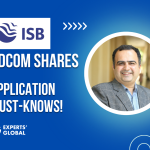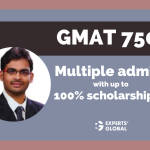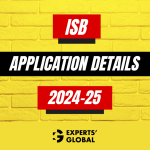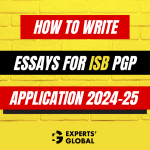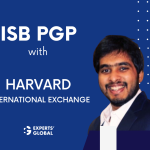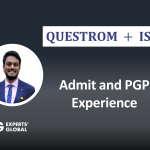Verbatim
Experts’ Global: Hi Santosh, thank you for your time! Could you kindly share your journey in your own words?
Santosh: Following my graduation from the Birla Institute of Technology and Sciences, I worked at L&T Construction before taking the GMAT and, with Experts’ Global’s ISB admissions consulting help, applied to the executive program at ISB.
Experts’ Global: What were the factors that you think made the difference in your success?
Santosh: Making the time to complete my preparation within three months, with the help of a GMAT online course was a difference maker. I also maintained an error log that I referred to repeatedly while studying in order to direct my studies more productively.
Experts’ Global: What were the main resources that you used during your GMAT preparation and what advice would you give to future candidates?
Santosh: I felt I was polished enough at quant work to only use the official material’s questions. To up my Verbal quotient, I used Craig and E-GMAT courses to clarify my concepts. I used free GMAT practice tests to choose a good quality mock test series for practice.
Experts’ Global: What are your thoughts about mock tests? According to you, how many and at what frequency should aspirants take GMAT mocks?
Santosh: Everyone should take a GMAT mock before their prep begins to assess where they stand. Thereafter, choose a series of high-quality GMAT practice tests and take one mock every week or so. When your mock scores begin to vary within twenty points of your targeted score consistently, you are ready for the GMAT.
Experts’ Global: What did you learn from managing the application timeline?
Santosh: I would recommend that you start working on your application as soon as possible. Make sure to have your undergrad transcripts in hand, because they can be hard to procure if you have been working for a while. The application forms for many business schools are quite comprehensive and require you to take time to fill them out.
Experts’ Global: What was your MBA interview experience like?
Santosh: I applied to IIM A, B, and C, XLRI, and ISB. All my interviews were highly conversational. They were geared at finding out my value proposition, and how I would be able to give back to my cohort. My MBA interview prep was quite useful at this stage.
Experts’ Global: Can you tell us more about your PGP experience at ISB?
Santosh: The PGP experience was multi-dimensional. Getting to stay on campus amongst a truly diverse learning group was life-changing. I got exposed to many different perspectives and functional insights. In addition to classroom education, the peer discussions in the PGP truly added to my managerial toolkit.
Experts’ Global: What would you like to say about your job search experience during the PGP? What tips would you give to future candidates?
Santosh: Most Indian business schools have on-campus placements. At ISB as well, we had particular placement days where certain companies would show up and inform us about the roles they are hiring for. We then went through CV screening processes and interviews to secure our targeted profiles.
Experts’ Global: How has the pre-application experience as well as your PGP experience contributed to your growth?
Santosh: Working with MBA admissions consultants Experts’ Global during the pre-application process pushed me to really introspect about my motivations to present an authentic story in my essays. The lessons from my introspections proved useful even in my placement interviews, and continue to inform my work today at McKinsey.
Experts’ Global: What are a few common mistakes that all GMAT aspirants must avoid?
Santosh: After you take your first GMAT mock, you will have a clear idea of your strengths and weaknesses. Make sure to work on addressing your weak conceptual areas. Keep a note of your mistakes so that you do not keep repeating them. Accuracy is important, but being accurate in a timely fashion is the route to GMAT success!
Experts’ Global: What are your final suggestions to the MBA hopefuls out there?
Santosh: GMAT preparation for three months at a stretch is better than piecemeal studies spread out over a year. Start working on your applications as soon as you can, and when it comes to the business schools you apply to, be both aggressive and practical. Apply to schools where your chances of admission are good, but also apply to schools with a higher pedigree where the admission gauntlet is tougher. Remember that you can attempt the GMAT multiple times, and that a bad score on your first try is not the end of the world!
Experts’ Global: Thank you for sharing your insights and journey with us today!
Santosh: This conversation has been delightful!

